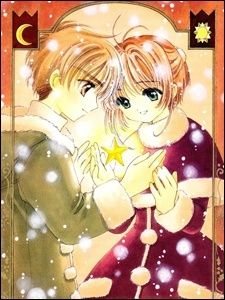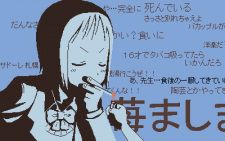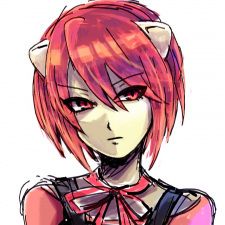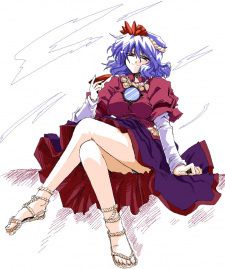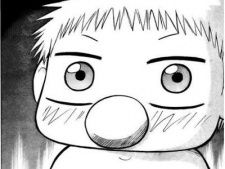Manabi Straight! follows the lives of a group of young high school girls living in the year 2035 while they attend the all-girl Seioh Private High School. Since the birth rate has dropped dramatically, schools are being closed down due to the sheer lack of students available to teach. Morale in schools has dropped dramatically, and Seioh is no exception. The story begins when the main character, Manami Amamiya, transfers to Seioh. After some initial hijinks involving a futuristic scooter and a swim meet, followed by an inspirational school song performance, she is inducted as the student council president. The story that follows pertains to Manami working with Mika Inamori, the only other student council member, and three other classmates named Mutsuki Uehara, Mei Etoh, and Momoha Odori, in student council matters. After some remodeling of the student council room, Manami and her friends set forth to plan for the upcoming student festival. (Source: Wikipedia, edited)
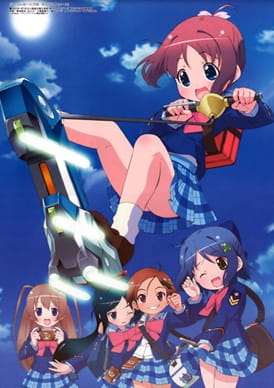





























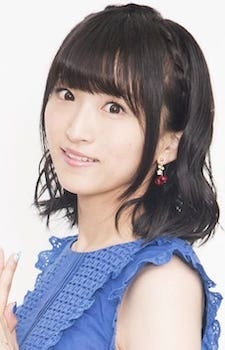
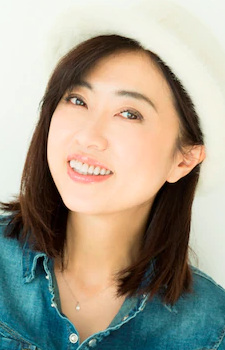
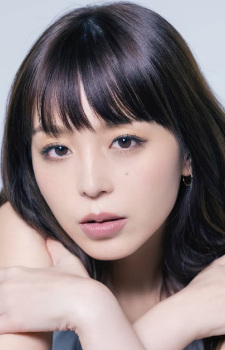
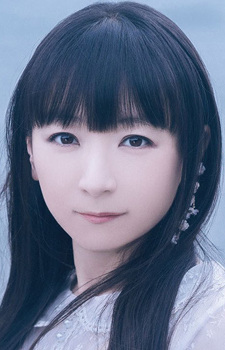
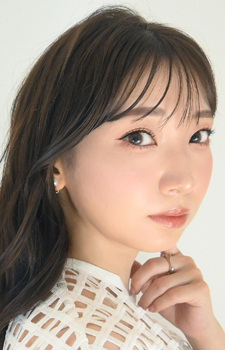
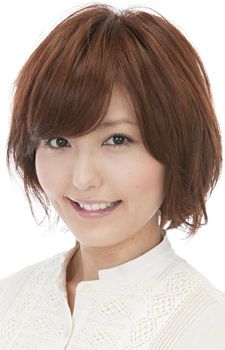





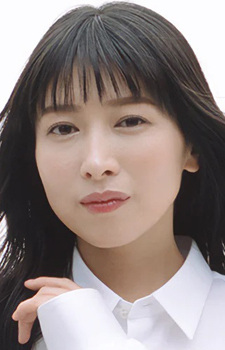






























What a wonderful series. I am so glad I decided to watch this anime. I wouldn’t hesitate to say it’s one of my favorite, maybe one of the greatest anime I’ve ever seen. Don’t be fooled by its childish loli-looking exterior, what lies in this anime is the bittersweet and heartwarming message of moving forward. The story is set in the future, where schools’ populations continuously decrease, and is about girls brought together by something as simple as a student council. They develop such a strong bond throughout the series, I don’t think I’ve ever seen an anime where friends were this close. Mainlyit is about them preparing and then trying to revive the school fair, which turns out to be a long struggle. There is the lighthearted and funny moments (mostly brought on by Momo with her refreshingly odd antics) but there are also sad and dramatic times. Each episode will bring on different emotions, some sad, some happy.
I love the animation. Each shot seems to be carefully done, and though some angles can be odd, others make the series a piece of art. The music is well done too, and the opening is so beautiful and becomes so clear as to what they've done once you finish the last episode. The ending theme is a little strange considering it is stop-animation, but perhaps this is one of the things that makes this series just a little different.
What I was very impressed at, also, was that when the times of Manabi singing, the lip movements actually correspond with the words perfectly, instead of going up and down. This isn't true the whole way through the anime, but there were instances where I saw the brilliance shine forward into tiny details such as that.
A strong controversy sets out over the "loli" factor. Yes, the girls are drawn looking cutesy and they look much younger than high schoolers, but if you get past that in which would attract viewers who would only watch this show for the cute girls, you see a deeper interior of a sweet, heartfelt anime that deserves to be watched.
There are also other debates as to whether to consider this shoujo-ai. They do blush a bit with eachother and hold hands, and things could be inferred there, but nothing is taken too far. I believe the story tries to focus more on friendship, but obviously there are some undercurrent hints.
However, I cannot give character as high of a score as I would like. The characters may be sweet and likeable, but really most aren't developed enough. While I realize it would take away the point of the show to feature their home lives, this results in a lack of character development. This could have been made up for by each character having an episode of their own besides Mei, whom in episode four you really get to see inside of her. Also, you would think the main character would be Manabi, but it is mostly shown through Mikan's perspective, probably the reason being Mikan is the person Manabi affects the most. So we see this change in Mikan... but do we really get to understand Manabi, and why she fervently defends the school she has been at a significantly short while?
You do get to go into Mikan and Mutsuki’s relationship a bit, which is nice; however, the a couple scenes with them proved to be a bit confusing, because it gives the viewer no knowledge of what is happening beforehand, at the current time, or afterward. It’s sort of a key point to why they are good friends, too… perhaps I missed something. I believe their episode is episode 6.
Don’t get me started on Momo. All we know about her through the entire series is that she has no attention span and she wealthy (which I’m not sure you really see until the OVA anyway). She may have been adorably odd and a treat to see on screen, but it’d have been nice to explore her personality a bit more. Yet despite these flaws, the characters are still enjoyable and each girl’s personality is different, but they still all become good friends.
To sum it up: the animation is great and the art is adorable; the characters are cute and very loveable but some could be better developed; the opening and ending themes are amazing but the BGM is forgettable; and the story is sweet and poignant and the end suggests a positive outlook in life. The basic concept of the story is maturing and growing up, while still maintaining relationships. Though this may not be anyone’s cup of tea, I still recommend this highly and Gakuen Utopia Manabi Straight reminds one of my favorite anime.
Gakuen Utopia Manabi Straight! This anime features wonderful creativity and enjoyment to the maximum, while not being bogged down with heavy clichés. I will not hesitate to say that it is probably my favorite slice-of-life series and probably one of the most touching series I have ever watched. 5 words review: Deep, touching, fun, cute, epic. Story: 10/10 The story is amazingly simplistic yet its plot is complex. In fact, this whole series is about the student council and the Seioh School Fair with absolutely no action or romance. There's not a lot of comedy, and it is basically a slice-of-life drama (weird, I know). Manabi Straight usesthe school fair to explore the true meaning of friendship, endeavours, and dreams as Manabi, Mika, Mei, Mutsuki, and Momo go through trials of hardship to find their courage and understand the bonds that they share. I love it for its ability to turn something so simple into a beautiful work of art.
Art: 9/10
For some series I often notice weird character facial expressions, awkward animation sequences, or lazy screen shaking/panning/scrolling, but for this series the art is really excellent. Of course, it is nothing that makes you say "wow," but there's just no flaw. It is a solid series with good enough animation to capture the vast range of emotions the series portray. What I love best was the opening sequence that made so sense. Aside from being one of the most artistic and best animated opening sequence ever, it is very "cool," matching the energy of Manabi and other student council members.
Sound: 9/10
Once again I would like to point out that the opening sequence was excellent, and it had an extremely catchy song to go along with it. Other than that, the background music was excellent and nothing seems out of place. It should be noted that Yui Horie voices Manabi, and she sings the Seioh school anthem, a pretty song, in many occasions throughout the series. Insert songs, especially good ones, are always a plus.
Character: 8/10
As well as this series convey feelings and emotions, nothing is really known of the characters outside of school. Manabi Straight is strictly about school and rarely do the characters go outside of school, and even so, it would be for a school activity. Manabi and Mika's out of school life is pretty much most explored, but for Mutsuki, Mei, and Momo, no one really knows anything about them. However, their personality and and actions are quite unique and noticeable, which gives them character, unlike other shows with three girls that are just too similar. Oh, and did I mention? The characters are way too cute (this is a good thing), even though they're in high school. It adds an interesting element to the plot, as well as showing the difference of experience between high school students. For example Takako, Aikoh's student council president, is shown to be taller and about high school age, and she is usually more mature and organized.
It should also be noted that a very widely known voice acting cast is used for Manabi Straight, including Yui Horie and Aya Hirano. The results are generally positive.
Enjoyment: 10/10
This category is very important, because Manabi Straight is often a "hit of miss" anime for many people! This means that there's one group that finds it extremely good while there's another group that finds it pointless. Since this series really have no meaningful story, it could be understood why some would hate it. The meaningful part of Manabi Straight is the bond of friendship, and while people prefer action and romance to create drama, I personally find friendship a very unique yet powerful source for drama. I often forget how important the bond of friendship is, and this series did well to remind me of it.
Overall: 9/10
I consider the series excellent, and even though it has lots of valuable messages, its best points were being enjoyable and "cool." I love how this series does comedy. It's definitely not overdone to take over the drama, but it is there enough to release tension. There are also some interesting additions, such as how the girls blush when they hold hands or are talked to, but I assume that this goes nowhere and that it's just there for fun. But overall, it is a series not to be missed, especially if you're taking a break for romance/drama or just trying to find something unique and interesting. I am personally impressed at how much a series like this could impress me. Don't miss it!
I swore when I seriously started writing reviews that I would never give anything a perfect rating. No anime was flawless no matter how great I thought it was. However, Gakuen Utopia Manabi Straight is the closest thing I've found to perfect. Set in Japan in the near future, Manabi captures the outlook of its setting better than any other series that's tried to work out such a scenery. It is made clear with a national birth rate crisis reflecting the current steady drop in Japanese citizen births, as well as advanced but realistic technology such as streamlined buses, computers built into desks, and student organizersthat are essentially limited-function Blackberries. These subtle points serve to add an extra glow to the already wonderful story presented.
Manabi's plot is so basic it may almost be seen as a flaw, but alas it cannot. So often do we get caught up in the grandeur anime has to offer that it becomes increasingly difficult to enjoy the simple story Manabi presents. But as is the theory regarding real life, Manabi takes great pleasure in the little things. Cleaning up what will be your office, making sure an assembly presentation is complete, recordng video interviews of your friends... all of these are either easy or mundane, yet for Manabi they are crucial plot elements and are thus treated with proper gravitas.
Likewise, Manabi's story is not just an event-to-event episodic process like so many modern slice-of-life series are. Manabi is clearly a linear storyline. Episodes begin with character development, begin to introduce conflict simultaneously, flesh out the conflict once the characters are developed, conflict is properly resolved, and the story is even given time for a dynamic epilogue that brings the message of the series full-circle. This is proper storytelling, paced to perfection with each episode having its own moment of new resolution for a contained or continuous conflict. I can think of nothing to take out or add upon.
Manabi is lead by five high-school girls, including the titular character. This is another point where Manabi stands out as well. Though each girl is given a requisite character archetype, their personalities were still given room to grow to the point that it no longer becomes acceptable to say "oh Mei's just a typical tsundere" and the like. Perspectives are also another plus as far as characterization goes, as the series starts leading us to believe it is from Manabi's perspective, yet it becomes clear as the series progresses that it is another girl through whose eyes we are watching the story unfold, and rightfully so as the epilogue demonstrates.
Though character designs are skewed young, similar to Lucky Star, they are appealing and don't pander to moe extensively. Cute, but not sickeningly so, and within reason. More to the point, the fact that the characters were drawn in a "loli style" doesn't do anything to harm the series as a whole. Besides, any high-schooler can tell you that just because they were 16, that doesn't mean they acted like it.
Manabi was animated by the spotty, hit-or-miss ufotable. All the stops were pulled out for Manabi though, from the gradient-style hair colors to the richly detailed web sites and chat room discussions. Animation flows smoothly throughout and frequently touches upon movie quality for its more poignant scenes. It's work that could hardly be improved upon and easily the studio's shining star for quality. One can only hope that ufotable animates another series of this art quality soon. Of course, ufotable included its penchant for a clay-mation ED sequence, but that is only to be expected, and the sequence is well choreographed despite its appearance.
The accompaniement is provided by first-time composer Yasuhiro Misawa, and I pray that this is only a taste of what is to come. The soundtrack captures the urgency of Manabi's pace with appropriate music throughout, ranging from slow and serene, to frentic and uplifting. No track is quite the same and quite a few well probably memorable for every viewer; the most memorable arguably being the *CLAP CLAP CLAP CLAP* that decorates every next episode preview and other scenes. The OP and ED, originally songs by the late, etheral Ritsuko Okazaki are now sung with a headier sound by famous seiyuu Megumi Hayashibara. Both are quite good.
The vocal performances however are all wonderful. Voiced by a blend of veterans and rookies to the field, each gives their all to their respective performance, capturing all the individual nuances of every single sentence. It's quite possibly the best ensemble cast for a slice-of-life anime, and arguably one of the best ensemble casts of any anime.
At this point I think it's rhetorical to ask if I enjoyed it. This series took me to every possible emotional high and, despite its short run, satisfied me to the upmost. Everything about this series has left me with nothing but good impressions. Though personal biases will easily detract some from watching this, those with an open mind regarding the style should come running. Anime does not get much better than this.
Overall, I proudly give Gakuen Utopia Manabi Straight a 10 out of 10.
Gakuen Utopia Manabi Straight! is a classic example of looks over substance. While not totally devoid of any redeemable qualities, it's hard to recommend Manabi Straight to anyone, as it is simply outclassed by too many other choices. The story revolves around the Seioh high school student council and its attempt at organizing the school fair. Underneath that lies a story of friendship between the five girls who takes part in student council activities. However, neither of these stories succeeds in gathering much interest for one important reason: the characters. Simply put, after the initial impressions, the characters of Manabi Straight get stale very quickly. You haveManabi, the hyperactive student council president; Mikan, the mousy and insecure treasurer; Mei, your typical tsundere in an all-girl setting; Mutsuki, the cheerful tomboy, and Momo, the side character with the attention span of a goldfish. There's not much to the characters beyond that, and if you have watched any significant amount of anime, none of the characters would strike you as original; but more importantly, the key flaw is in the lack of meaningful character development. Viewers are never given a glance behind Manabi's over-excitable disposition, hence they never come to understand her zealous passion for the school. Mikan's growth from her shy self is done in the ancient formula of "confidence through friendship", the kind of stuff you would expect from series aimed at younger children, such as Digimon. The only meaningful character development happens with Mei, but most of that takes place in one episode during the first half of the series, leaving the rest of Manabi Straight rather dull.
The underlying friendship story concerning the student council as well as the rest of the school is just not very compelling, partly because of the caricature-like main characters, as well as the cliche developments that you would be able to see coming from a mile away. Because of this, it's very hard to actually care for the personal struggles of the characters or the school fair, which accounts for much of the overly simplistic plot.
On the bright side, the art style of Manabi Straight definitely scores it some much-needed points. The colors are very pleasantly vibrant, both in the backgrounds and on the characters, producing an unique sheen. The characters are drawn in a slightly chubby style that is probably cuter than their actual personalities will ever hope to be, though trying to pass them off as high school students is a very long shot. Beyond that, the animation in the movements and mannerisms of the characters are above average, though the detail is never too high when dealing with the simplistic (but pleasant) character designs.
In the terms of sound, the seiyuu of Manabi Straight did a fine job, though Mikan's mousy voice may get on some viewers' nerves at by the end of the series. The musical score consists of nothing too memorable, but nothing offending either. The opening, ending, and insert songs are also commendable, but once again fail to leave much impression.
In the end, beyond the refreshing art style, Manabi Straight fails to impress. With a story more suited to younger audiences, yet a concept that appeals to older viewers, it suffers from a sort of identity crisis. The comedy is sparse, the drama is weak, the plot is cliche, the characters are generic -- reflecting upon these facts, Gakuen Utopia Manabi Straight! probably turned out better than the sum of its parts. Of course, that's not saying much, as Manabi Straight remains merely a mediocre experience.
Gakuen Utopia Manabi Straight, or just Manabi Straight, is a school life anime that has been mostly forgotten by time. The term “underrated” is a somewhat contentious way to describe a show, (because who is to actually decide if a show receives enough attention/phrase?) and risks sounding pretentious or overly-emphasizing a show’s quality. However, in my eyes, Manabi Straight is a truly underrated show. With less than 27,000 members registered on MAL and only a mere 100 favorites, I feel that its lack of lasting attention from most anime fans is disappointing. It bears some obvious narrative similarities to the likes of Lucky Star, K-onand Azumanga Daioh, yet unlike those shows, has not been beloved by time in the slightest. There are certainly reasons for this, and I do think Manabi Straight is more niche of a story and has far less widespread appeal than the former three. Still, Manabi has a lot going for it, and is certainly worth a watch for those that enjoy the aforementioned anime.
Manabi Straight is, to put it bluntly, a show about a bunch of cute girls in high school. However, Manabi handles a setting and attitude that I have never seen in another anime. Unlike most school life shows from this era, there is no initial school pride or excitement from the characters to enjoy their academic duty. Manabi takes place in 2035, where Japan remains mostly unchanged, besides the increased work force for its citizens from an earlier age. High school is made optional, and job opportunities and trade schools are opened up to teenagers very early on. Realistically, most teens in this world choose to begin their careers sooner, deciding on a solid paying work schedule over four more years of mandatory education. Due to this adjustment, high schools are a dying breed, and are constantly merged into one another because of the lack of both teachers and students attending. The kids at these high schools are mostly independent, studious, and appear to be even bored, focusing on their schoolwork first and having little interest in the excitement of high school activities. This concept feels unique right off the bat because it allows for some obvious questions. What will the characters get up to in the show if they are not even interested in going to school? What are the different perspectives and attitudes towards this system?
Enter the main character Mikan, an adorable and easily flustered high schooler senior who was roped into running her high school’s student council. Mikan is without a doubt, Manabi Straight’s protagonist, as she has the most meaningful interactions with each character and the strongest development throughout the story. The titular Manabi herself plays the Kamina to Mikan’s Simon, constantly motivating and humbling her friend in hopes of seeing the leadership and strength that Manabi recognizes is there. Mikan begins the show by sloppily presenting a slideshow on the student council’s importance and attempts, halfheartedly, to encourage her classmates into joining her. She is paid no attention by anyone, not even the teachers, and loses her motivation quickly on this cause. Manabi then steps up to the stage, excitedly announces her want to help Mikan, and then SINGS the school’s anthem for a few minutes. This entrances the crowd briefly, as they sit both confused and curious about who this Manabi girl even is. Thus starts the story of Manabi Straight, as these two unlikely girls are now joined together in hopes of bringing back school spirit and fun to this futuristic, less school-dependent society.
Manabi Straight’s first three episodes ultimately serve to introduce the main plot and characters, managing to be both a strong start to the central narrative and a lot of fun on their own. The ultimate destiny that Manabi wants to accomplish is a School Festival. In Manabi’s eyes, that will be her last hoorah for the senior class and a way to motivate interest in the dying out high school setting. Manabi and Mikan indocturate other members to help with their school festival, members who join somewhat half-heartedly initially but do progress and begin to share Manabi’s spirit. Although the main five girls are fairly simple and serve mostly as means to help the story progress, they are still a lot of fun and really entertaining to watch. Manabi is a spirited leader and the heartbeat of the show. Mikan is a somewhat timid and grounded girl who agrees with Manabi’s ambition, though is less blatant with showing it. Mei is tightly-wound and focused, Mutsuki is bold and well-respected by the school, and Momo serves mostly as comic relief/to even be the eyes of the audience. Although these characters do fit obvious archetypes, and are not the most nuisanced outside the plot/their roles within the show, I still found myself endeared to them greatly, and wished I could have seen more of them. The little moments of them sharing excitement together, working on planning for the festival and even just spending time relaxing are always comforting.
Each episode of Manabi simply portrays a portion of planning for the school festival. Small arcs occur, typically involving setup for the big day (like indoctoraing clubs, signing petitions, getting motivated, etc.) Although I think Manabi Straight is mostly consistently good throughout, there are a few moments in the mid section that felt slightly forced and cheesy. The biggest for me being Manabi’s brother dating Aikoh’s principal, which felt only present in the story to create added internal conflict for Manabi. Aikoh’s principal’s role and personality felt kind of forced in general, since most of the other teachers and adults within this story were endeared by Manabi and her excitement for the festival. Still, these qualms are few and far between. Big moments happen in almost every episode, from friendship developments between the characters to the ever-emotional scene in episode 10 in which Manabi is able to bring her entire school together.
Episode five definitely deserves a mention for being my personal favorite in the entire series. This episode focuses only on two characters and their hesitant friendship due to past circumstances. As the episode progresses, the two characters learn more about one another and complete different tasks without reliance on outside forces helping to break the tension between them. I am a big fan of montage scenes that are able to show off progression in a brisk yet emotional way, and this episode definitely does not fall flat in that regard.
The ending of Manabi is also truly special. The characters graduate in the last episode, a common destiny for shows about girls in high school. However, Manabi takes its story a step further by showing the characters after high school, and showing each of their decisions they made for their futures. This definitely adds further weight to Manabi’s story, and really makes the entire show completely justified for just how well it wraps itself up.
If I had to describe Manabi Straight’s story in one word, I would choose “cinematic”. Each episode of Manabi flows into the next as if it were a film. Little time is wasted for less important moments that would be service to the audience, as the show feels tight and most scenes feel somewhat necessary. Of course, Manabi Straight is still a show about cute high school girls. There are moments of silliness, weird interactions or just a second to look at the character in a cute pose. Still, it really feels like Manabi Straight is emphasizing the importance of its message and using its characters’ development as tools strictly for that mission. Shows like Lucky Star and K-on have more character interactions and variety in topic, which gives both of them the advantage of making one more invested in the characters by the end. However, neither of those shows have the consistent central story of Manabi. Where Manabi lacks the wide variety of discussion and added personality to its characters, it decides to prioritize the linear message of how important this goal for the characters is. I feel that this benefits the show greatly, considering it is only 12 episodes and it was a treat to see a well-done story about high school girls instead of taking up that time for random bullshit and typical tropes.
Comedy wise, Manabi Straight is pretty strong. There were several instances when I laughed out loud at scenes and jokes, usually due to the unique timing. Manabi’s style could be described as a mixture of both slapstick and dry humor, often involving weird actions from the characters or a few seconds to let something bizarre that was spoken sink in. An example of this is in the first episode, when Manabi herself is late to school. She frantically asks a girl (later introduced as Momo) walking by for directions, and is pointed a few feet away from the steps going up the hill to school. Manabi completely ignores the steps and flies her scooter straight into the trees next to it, constantly whipping through trees to get to the school on the other side. And at times, the absurdity of a moment is the joke. Halfway through the show there is an entire scene of the characters losing their minds due to being overworked/experiencing sleep loss. Mikan begins to wreck their club room out of desperation to reorganize it (a common symptom of overstress) while Mei, Mitsuki, and Manabi taunt each other out of frustration and take turns smacking one another in the face. The ridiculousness of scenes such as this one provide further realism and character interactions, allowing for the potential happening of the Student Festival to be all the more important to the audience as it is for Manabi’s characters.
Manabi Straight’s animation and art design can be described as ambitious and high-spirited. UFOtable may be known as the “Type Moon” studio nowadays, handling both the Fate and Kara no Kyoukai franchises, and pairing those stories with highly stylized and bright digital animation. However, a decade or so ago UFOtable had a very different aesthetic, which came across in both their graphics and stories. Their shows featured colorful and poppy animation and cute rounded character designs (you can see this in other 2000’s UFOtable productions like Ninja Nonsense and Dokkoida) and Manabi definitely continued this trend. Everything about Manabi’s setting is alive and bright, from the whimsical looking school to the detailed club room. Each girl’s room and house is shown throughout the show, and each of these settings is filled with so much variety and specific detail that they all have strong distinctions. And by the end of the show, the viewer will have somewhat of a spatial idea of the school, considering the show’s tendency to show off different angles and areas that the characters have wandered. This may seem like a pedantic compliment, but it is one I truly was very excited by. It is not often I can say an anime has made me feel aware of its central location’s proportions and that they have stuck in my mind, since that seems like an afterthought for a lot of shows, especially high school comedy ones.
While I can not defend Manabi Straight as having the best animation ever, or even being a contender for that contest, I can strongly state that it has some of the most unique and interesting animations cuts I have seen. There are many little moments throughout that stick out and add an increased flavor to the show’s direction. Manabi growing wings as she motivates her club and flies around as her ideas are portrayed around her. Mei sitting in her lit-blue bedroom sadly while only her video game’s reflection is shown bounced off of her wall, which feels very Hideaki Anno inspired. And episode four must be praised for having the most interestingly animated scene in the entire show. A flashback showing an entire classroom of students with blindly neon inverted colors, emphasized in that fashion to show Mei’s despair and unease. Manabi Straight just feels unique with the way the characters move and interact within its universe. It often shows very blatant animated symbolism, which of course adds intrigue and enhanced attention due to straying away from stagnant direction.
Of course, I can not discuss the artwork of Manabi Straight without mentioning the character designs. Manabi’s Straight’s characters are all drawn as cute and goofy looking lolis topped with bright hair, which I am fully aware will immediately turn off an entire crowd of viewers. However, it should be mentioned that everyone in Manabi’s story looks that way, even the adult men have rounded proportions and somewhat cutesy faces. Personally, the weirdly juvenile and innocent designs did not detract any of the show’s likability, and instead contributed to its unique narrative (which is of course, a coming of age story). The characters in Manabi also often make silly faces or have funny mannerisms (Manabi’s iconic raised fist is a big stand out) and I was admittedly endeared by just how cute they could be at times.
Manabi Straight also has an extremely memorable and outright delightful soundtrack that suits it well. Each background song has so much personality and care put into it, often complimenting its given scene with grace. Fully orchestrated string pieces are played with the more melancholic and poignant scenes, and the upbeat moments are paired with upbeat clapping and what sounds like a really fun jam session. Manabi Straight also has one of my top five favorite openings ever, which might be surprising to some, but I can not deny how much of a fun earworm it is. Sung by the ever-wonderful Megumi Hayashibara, who has not only talent in voice acting but singing, “A Happy Life” is a motivating ballad with sweetly sung lyrics and exciting buildup in the background instruments. The characters are shown running around their school and appear almost as if they are being videotaped, shown in interesting angles. This video may appear nonsensical for a first time viewer, but has incredible payoff in the context of the ending.
So do I recommend Manabi Straight? Obviously, I just gushed about it for a dozen paragraphs. If you are a fan of Cute Girls Doing Cute Things shows, you owe it to yourself to watch this one for its uniquely structured story and likable characters. If you are into original anime in general, or just want to see a tightly done yet fun narrative, it is also recommendable. Manabi Straight was an especially touching show to rewatch during these intense times, as it provides an entertaining tale that mostly revolves around the importance of taking advantage of the excitement of teenage years, no matter the circumstances.
Fuck! That was so good. This anime does not waste time on useless scenes, every second and minute of it was perfectly crafted and tells a beautiful story. The Art was exceptional and the sound shook my heart. The characters were the crucial point of the anime which each and every one of the cast was unique. Blah blah blah. To summarize, this is a SOL anime that does not go through the usual pains that average SOL presents. It is cute and adorably cute at that. The pains were logical and yet presented perfectly, Sometimes SOL anime creates a premise where it forcefully makes the charactersuffer simply because for the sake of it. This anime does not but it creates an endearing story that showed a particular universe where 5 different people come together and make things happen. This is its beauty. A good start, a smooth flow and an excellent ending. Fitting in the genre and tells a story that is unique in its own way, filled with lovable characters, presented in cute art, accompanied with outstanding soundtrack. I totally enjoyed it - 10/10
This anime takes place in a nearby future and it`s a group of cute girls living their high school experience kind of show. What differences this series of others of its kind is its focus in school (not in school`s events but in the school as an institution and how characters deal with it) and time set up which as mentioned previously is placed in a future where highschool is not mandatory and a much less popular option than now. One of the things I found more interesting about this show is its view of the world in a slightly distopic way. Aestheticaly talking this showsin the color palette the series uses which is at least interesting and likely to catch your attention as it`s not what you expect of a distopic show. I personally liked it a lot.
One of the most appealing aspects of this kind of shows is the cast of girls, in this case we have a group of girls similar to the k-on`s one, where they all have an in interest in common (being this interest the student`s council and the correct function of the school experience). It`s also similar on how the characters develop, being this aspect reduced to only to the relation the girls have between eachother and with the school. You won´t find love or family drama, the struggles the characters face in this anime are ones such as: finding what to do with their life after school, over coming a school trauma...
This series also comments about the nature of highschool which may resonate with you at a personal level if you disliked or didn't fit very well in the highschool system.
I would definitely recommend this show to anyone who likes the school genre and it`s looking for something more meta or slightly different
This was such a good anime; the past flashbacks and the piano made me tear up so much. It reminds me of simpler times when I used to see green meadows all of the time, had more parks around my area and more fun things to do. Now, most of those areas are closed down for building reconstructions or the ones that I used to play in already have new buildings over them. The official music of it really knows how to hit me deep in the heart and I love this anime for giving me something different. Despite its short length, everyone whom is an anime loverneeds to give this one a go; even lifts up your spirits if you are in your own student council and are feeling like your word is not getting to the people.
This anime is a reminder that true effort will be heard; though perhaps you will not have as many, dare I say, buddies as the girls in this anime did.
But, it reminds you that some people will reach out to you if you cry loud enough. It reminds you that you can make bonds with new people, even if it does not seem so.
And lastly, it reminds you that you should never lose faith in what you believe in. That, you should always be yourself and never let the cold foot of oppression weigh you down.
I chose the most popular video of this anime, apparently being this music mashup (sounds really good by the way), to spread the word for those that think it is another generic anime. I highly recommend you give it a go; you will not regret it. If you doubt my prior mentioning of the piano music being good, here is a sample:
https://www.youtube.com/watch?v=w9_cyzhsXYQ
Just from listening to this, you can tell already that most of what I have stated about this anime is extremely true. If you do not give it a go, you will miss out on an unforgettable story set in the actually-pretty-near future of 2035. Where we will have holographic devices and hoverboards. But, do not let the futuristic setting turn you off; they do not even reference it that often, either. The story is true, crisp and recommended for even new anime.
If I have to be a hundred percent honest here, to make sure I am not just giving this anime positives the entire time, the only true flaw to this anime was that it did not play the piano songs often enough; it specifically played the interlude song quite a bit, which was extremely catchy, but it felt like it did not have enough variety in the way it spread its music. I swear it felt like I was hearing the same few songs over and over again, though it does have more music that plays for specific episodes.
So, yeah. The only true problem with this anime is that it falls under one of those anime that had a repetitive soundtrack. But, it does shine when it plays those piano songs, among other pieces, in the sad, serious and meaningful scenes. Truly, its story is actually un-flawed and, at first, it gives off a vibe that it might fall under those "main character is overly hyped and naturally makes everyone feel better" but the main character only helps out a little bit; the bonds are formulated by the other characters themselves and not just under the sole influence of the main one. So it really makes for a unique feel to the slice of life genre and, haven't said this enough already, is worth the watch.
Gakuen Utopia Manabi Straight is a Manga series created by the animation Studio, Ufotable. They're probably best known for their work on 2x2=Shinobuden, the Tales of Symphonia OVA, and, most recently, Fate/Zero. It shouldn't be any surprise that an anime quickly followed. There's even a visual novel game for the Playstation 2 based on the series. However, in spite of being semi-successful in Japan Manabi Straight was never released elsewhere. Let's take a look at the anime and try to figure out why. The setting is a future where Japan has a declining population and schools have less students partially due to the lower birth rateand partially due to a system of apprenticeships which leads a lot of youngsters to just skip school altogether. The setting is Seioh High School where an incredibly energetic transfer student bursts into the school and quickly nominates herself for student council President, which she gets because no one else wants the job. The episodes follow her and four other girls as they attend to student council business, in spite of several of them not even being part of the student council. The episodes do have a clear progression but they don't have an underlying story. It's reminiscent of Azumanga Daioh in that respect. There are a few major themes, mainly camaraderie and moving boldly into the future, personified by Manabi's favourite saying "Forward Go!" The major difference between Azumanga Daioh and Manabi Straight is that Azumanga Daioh focuses on the comedic aspect and Manabi Straight focuses more on cute, fluffy moments. On the plus side, it works very well. It's a fun series with lots of good and funny moments. The themes get a little heavy handed, but they're pretty well handled overall.
By themselves, the characters are pretty standard archetypes. However, they interact very well, they play off of each other pretty strongly and they bring out complexities within each other that aren't readily apparent. I can't really tell if that's a deliberate way of strengthening the camaraderie theme or if it just turned out that way. I have a feeling it's the former.
The art is the one aspect I really don't like. They use a super chibified art technique that makes all the characters look roughly ten years younger than they're supposed to be. The imagery is very deliberately bright and vibrant. They also do some really interesting things with the art at intense moments. Sometimes they go overboard, but it usually works and, in spite of my general dislike of the art form it works for the series.
The voice work is pretty good, for the most part. There is some over-exaggeration, especially from Horie Yue but it generally works for the scene so it's not too much of an issue. The music is spectacular. The school anthem, the themes, and the background music are all perfect for the series and excellently performed.
The yuri factor is a 6/10. The main five girls cuddle up to each other consistently. Mikan also develops an obvious crush on the student council president of another school. None of them go beyond being cuddly, but it's still pretty homoerotic and there's definite yuri potential.
My final rating for Gakuen Utopia Manabi Straight is a 7/10. It's a good series. If you're looking for something that's energetic, funny and just generally fun you'll probably enjoy it. It's kind of similar to Azumanga Daioh or Gokujou Seitokai, so if you're a fan of either of those I would check it out. However, if you're looking for a complex story or action-packed fight scenes you should probably look elsewhere.
As for why it was never released outside of Japan, maybe they felt that an anime that emphasises cuteness and uses humour as a secondary aspect wouldn't do well for international audiences. That's my best guess.
Education is considered one of the most important tenets of civilization. In many ways, education has helped people understand each other; for example, reviewers write about what they like and dislike in a work and the masses can respond to them by either clicking those two buttons below all reviews, or directly thanking/criticizing them.Thank an English teacher every time you f-bomb a reviewer. Language is the greatest tool invented by humankind. Without language, we will not be civilized. We will not be able to watch anime or invent baconnaise. Many parents and teachers claim that school is a forum for thinking. School is the place tolearn how to collaborate. In the real world, most projects require more than just one person. If one cannot work together, one loses many opportunities. Chefs have to work together with assistant chefs and waitresses to serve the best food; delays and a lowering of quality can happen if the employees are obtrusive and inexperienced. There are many cases that the teacher-student relationship blurs and this is why school is so great; namely, we all can learn from each other. There is no other place for learning many things besides a school.
Manabi Straight’s setting argues that the quality of education, the importance of school, and teamwork will degrade in the future -- it is set around 2035. Some viewers, interested in the field of education, may also argue that this is happening today. Colleges are becoming more expensive and it seems more practical to start in the workforce; my mathematics teacher said that an experienced plumber will earn about the same revenue as a doctor in a lifetime. In America and Britain, education systems are on the verge of a revamp. Japan’s student scores on science exams has steadily decreased, but the students feel less stress; this is quite unlike its neighbor, South Korea, which has problems with student suicides. What should the education systems do? What is the meaning of school today? These are great questions to ponder for politicians, people in the education field, students, and parents. Without a doubt, this is a fantastic setting that asks us to think about the future.
Manabi, a new student, has elected herself as the Student Council President and, inspired by the school anthem’s lyrics, has started creative projects to vitalize the school. If there is one reason to watch the show, it is to watch Yui Horie’s fantastic Kushieda Minorin-like performance. Her character personifies the idealistic view on the meaning of school. She is a genki girl that believes in the power of friendship; her humor and gregarious personality is admiring. A natural-born leader, Manabi manages to lead the student council despite her status as a newbie. Her struggle as a character is awe-inspiring and drives the story forward; if you are a college admission officer, you should immediately accept her into your college no matter how prestigious it is. If you did not feel any emotion from her singing the school anthem in the first episode, you have no soul. She is just that awesome.
Like Azumanga Daioh, the work also has a character people can relate to. Voiced by Haruhi, Mei personifies those students with a strong sense of responsibility. Everyone knows at least one Mei in our lives; we also have different opinions on people like her. She is a fantastic character because her archetype appears in other works. In Manabi Straight, we see her archetype through a sentimental lens. This is to provoke our minds into changing our perceptions of characters and people like Mei. Thus, Mei is the most realistic and human character in this whole series.
Takako, as well, deserves a mention. She should have been a main character. A mentor to Manabi, Takako is a bored student council president in a typical rich girl’s school. Until she meets Manabi, school is nothing more than a place before work. Her character becomes dynamic and more humane. Thus, her character is complimentary to Manabi’s. Both characters develop the themes together and their interactions are the most interesting ones in the show.
Sadly, this is the end of positive aspects of the show. Everything else is as stale as a live-action Disney show.
The story is hampered by the other characters: Mika, Momoha, and Mutsuki. Mika is the shy girl character and her path to adulthood is predictable and pointless. Momoha is one of those characters that is “unnecessary, but oh well, let’s add her because she is moe”. Mutsuki is genki and that’s about it; she is clearly Ritsu from K-On!. These three people slow down the story to a snail’s pace, using terrible jokes that people really don’t care about.
Thus, this brings up another point. What is the focus for this show exactly? Manabi Straight has an impressive setting and this work has the potential to be deep and thought-provoking. This reminds me of a work like Sora no Woto, a combination of K-On! visuals and antiwar environmental themes. Why can’t this work do that? Instead, it goes back and forward. Pacing is abysmal. Mika is not the main character; Manabi is. Why are we hearing her thoughts instead of Manabi’s? The story and theme feel underdeveloped thanks to teetering and its most dramatic moments succumb to it.
Art direction is generic and the lighting feels underexposed. This is probably a stylistic choice, but it makes it hard for viewers to see. Character designs are standard lolicon. It does not venture into more creative territories. There is nothing daring or expressive that ufotable did. It is just so bland that words can’t express it.
Any anime enthusiasts will figure out the clock tower’s bell. It is a commonly used sound effect, which also appears in the Umineko visual novel series; I assume the Golden Witch is rolling her head in her grave. Manabi’s OP and ED are standard forgettable j-pop songs. Sound, as a whole, is ordinary at the very best.
Sometimes, I think too deep into many things; Manabi Straight’s setting is one of them for sure. Thus, it is a pity to say that I am disappointed in such a promising setting. For a work with such a huge potential to be more than just moe, it feels lacking. A bore, most of the characters should have been cut out. It focuses on the wrong things at the wrong times and there is no limit to its genericness. Manabi Straight is just a slice-of-life show featuring lolicons doing cute things. It does not sit well with me.
One of the forerunners of the Cute Girls Doing Cute Things genre, unfortunately this series was completely overshadowed by the release of Lucky☆Star. This series is an interesting glimpse into the anime culture that was developing before the massive influence of Lucky☆Star and K-on! dramatically changing the landscape for this kind of anime. The series is mildly experimental relying more on light story than daily gags, and I plays with social commentary on Japan's declining population. One of the first if not the first anime to ever do so. The story is charming, the artwork is insanely sweet, the characters are realistic yet fictionally adorable, and the soundtrackis actually really unique for the time. I can't think of a single anime that has ever used a percussion based OST for motive and mood setting like Manabi Straight! has.
If you are a fan of the Cute Girls genre, this is a series that is all too often overlooked, and forgotten about.
It is an absolutely sweet yet goofy light drama that reminds me of popular Shoujo-ai story telling over the modern CuteGirls typical daily life gags, despite being not being Yuri.
For those who critisize this series for being unoriginal, remember that this came out before Lucky☆Star, K-on!, Nichijo, Gabriel DropOut, Minami-ke, Love Lab, Yuyushiki, Non Non Biyori and really most of the genre.
For the timeframe, Manabi Straight! was fairly unique take, and it still has a unique ring to it to this day.
Always remember the context of time frame and culture when rating and judging an anime.
And in such Gakuen Utopia Manabi Straight! stands out as quite an interesting and unique attempt at a genre that had yet to flourish.
Gakuen Utopia Manabi Straight is a wonderful, adorable and incredibly melancholy series that I believe is horrifically underrated and absolutely worth your time if you've watched any amount of slice of life shows. I was quite surprised to find that it had such a polarising score especially for a show where nothing happens, needless to say I expected a Moé show in which girls generally sat around a kotatsu and did club activities. I could not be more wrong; this show is possibly the absolute best CGDCT moé show out there, I do not say this lightly The first half of the series (episode 1-6)is completely set on developing the characters. When I watched the show I was completely shocked, the amount of character development which in a weaker show would be completely brushed under the rug gag characters were fully realised and relatable characters who I feel had depth. This is shown no better in Aya Hirano's character "Mei", not only does she have the best episode but they take the general "shy-girl/tsundere" archetype and develop this character in 2 episodes better than any other show I've seen do in 12+. For example, I believe Mei has far more interesting character development than Sakaki from “Azumanga Daioh” which had significantly longer to develop their shy-girl character. This applies to all the five main girls sans Momoha. Manamii, Mika and Mei all have chemistry in between each other that makes you believe in that a real friendship can exist which is not something I can say for a good amount of other CGDCT Moe shows.
By the seventh episode you are on the end of your seat hoping these characters can get the best possible ending that they can and that they excel in their future prospects as adults.
The second half of the series (episode 7-12) is set on the goal of the school fair, this is the goal looming over the series. A deadline giving you anxiety on the ending of the series and a constant reminder that the series will end. I will be omitting this from the review due to the spoiling nature of it, but it is absolutely the pay-off and ending that this series needed.
The art-style of the show is nothing less than gorgeous, it has this “hair-gradient” style that I don’t believe was used in a show prior, and defines the look of these characters. This hairstyle I believe was used extensively in “Higurashi Gou” but in a way less visually appealing and cheaper manner, in comparison Manabi Straight is absolute visual eye candy, this goes from the opening song all the way to the ending Claymation sequence. The show looks extremely high quality and looks absolutely timeless whether watching on a CRT tv or a modern flat-screen monitor. The series relies on grungy greens and blues to emphasise the grim and gloomy nature of the series for a good amount of the show, while using warmer colours while showing the characters in a more “normal” setting.
As you may notice I have not mentioned the setting of the series yet, this is because despite the first episode constantly pointing out that it sets place in the future, the rest of the series kind of has it as a backdrop for the characters and plot which take the full centre-stage, this doesn’t mean that the plot isn’t .
The future of this world is a Japan in where the birth rate has dropped so low that there is not enough teenagers interesting in going into high-school that they begin to go into the workforce as soon as possible, to the point where high school attendance has completely plummeted and the experience of high school is getting so much rarer. This is not necessarily the most out there plot that anime has to offer but it is significantly more grounded and depressing than the outwardly cutesy and moé appearance of this show may let you on to believe.
I was constantly thinking while watching how the depressing nature of most high schools, this dystopian future depicted in the show and the hash blues and green used in the show could possibly even give conditions for a girl like Manami to exist. The students of this show represent this feeling and atmosphere, as every time they're shown they're generally depressed. This is for the one exception they're talking or referencing the newly revamped student council. Where they are generally off the walls energetic and what you'd expect most of the bland background characters to be in a show like this, I believe they are meant to contrast the off the walls main character types (such as Manami) attitude that most adults seem to share while looking back into their past as teens, to the attitude that 99.9% of high schoolers feel while in high school, complete apathy.
I know this may come off as needlessly harsh or edgy, but I believe if you do not see the beauty in a show like this after watching the full 12 episodes (plus the OVA) you have either: been home-schooled since birth by led sniffing cocaine-addicted parents, have an I.Q. below 50 or an inbred contrarian troll.
Thanks for reading this complete ramble review of a show I love; I hope that when/if you’ve watched it that you feel the same excitement for it that I do.
I love Manabi Straight and I hope that you do too.
Another day another anime another review where i have to come up with interesting things to say about said anime. But this is not just any other day,it's a rainy day and i'm dead tired.Only thing keeping me awake is my pure hatred which i'll try to transfer into this review as best as i can. And where to start really?When an anime such as Manabi Straight is so devoid of..Anything to be honest. Let's get the story part out of the way since there's no story to talk about..It's just another slice of life anime..Cause we needed one in 5 minutes,correct?Well no we didn't need another Moe-SOLanime in our lives but market says otherwise and the rest of us who were not hit in the head as children have to suffer for it...Basically all you need to know about this anime is that it's about a school FULL of girls and more specifically the student council which tries to overcome some problems such as "oh no my nail just broke,what is the society gonna think i won't be able to get married" and "oh my god the festival we planned is gonna get cancelled OMFG i'll die"..I would commit suicide too if those were my only problems in life..
And don't whatever you do be fooled by the description and think of this as an anime where dark themes are explored in any way at all..You might have thought that they would at least explore the reason why kids choose not to go to school or why school is deemed unnecessary or at the very least a mention of the ever decreasig population..And you'd be wrong,very wrong..In fact this anime is just about cute girls and their cute things.Sure there are times where they try to pull off some dramatic scenes but they are so obviously fake that even a 3yr old would die laughing.
And speaking of kids why don't i share some thoughts on the characters?
Well there are characters for sure and many of them but who cares?Did the writers care?Not in the least it seems cause apart from Manami the rest of the cast is like watching a dead horse race.
I'm prepared to bet you all of my hair that the stuff had a meeting and said "right lads,moe sells..So to prove how idiotic the moe lovers are i have a proposal to make..Let's make only the main character interesting in some way and not bother at all with the rest of them,see how that pans out".
And boy did it work cause anyone with working brain cells could plainly see that this cast is a farce.To put it into perspective Manami while offering nothing new in terms of characterisation,is at least a joy to watch and full of energy..In contrast the rest of characters are like they overdosed on these new zombie drugs.In fact if you search the term "generic archetypes" a photo of this cast is gonna show up..Somwhere along the way they did try to breathe some life into them but it was hopeless.The show was already consumed by the moe-fog and as a result you can't connect with them as characters to the point that if someone came into the school and killed them all you wouldn't even notice.
So even if it had a story it woudln't have the characters part right.
Visually i can't say i'm dissapointed but i'm not over my self with joy either.The character designs consist of a faux chubby loli style which is all the rage in the circles of child molesters in the late years.No facial features whatsoever,with huge eyes and they look like they're a LOT younger than they're supposed to be.The backgrounds and the tone is well done,nothing fancy but they cleverly hid that under tons of vibrant colours..So it's like sleeping with a woman who has tons of make up on and when you wake up next morning you are next to a 40yr old man.
This might be the result of the absence of a director.The role of the director was taken upon by a team of creative staff members.Now i can't very well sit here and say the whole thing worked cause yes the visuals were nice-y but again it lacked story.
In their defense the last episode was at least a lot better than the rest of the series.So there you go,if you want an anime with fluffy shit all around and a cherry hid in the mountain of shit,go ahead and watch it.
Now before you march in with your opinions and whatnot i want you to do an experiment with me..Try and read every review,every comment and try not to find the words cute,moe,romantic or other similar words to describe the show.
Manami is at best a generic mediocre borefest..And we had enough of these already,in fact 80% of the shows produced are the exact same copy of each other.So yeah sure they're heartwarming and all that crap but in the end they're not special..In fact they're not even worth of mention.
What can I say about Gakuen Utopia Manabi Straight!? This is the first review I have submitted in MAL and it's for this awful anime. I gave it a go due to the rating it has an the other reviews and I regret that decision. If you are interested in a soft anime to past the time give Gakuen Utopia a chance, you might like it who knows but if you are interested in getting a good laugh stay away from this. Rest assure this is not going to be a full of hate review not at all, there are a couple of good thingsin this anime for example
* The characters *Manabi is a straight forward girl that has a unique way of acting and doesn't take things seriously giving problems to everyone around her. In each episode we see them supporting each other and also learning a little about the secondary characters past which is something that is not often shown.
*Story> I got to admit that it caught me. The ideal of a school life anime which is involved about school life almost ending is something that I have not seen before, the main issue is that they focused on how to make those days joyful instead of the reasons why those specific characters decided to go to school.
The sound it has it's not the best but due to the environment it takes place it makes sense. The art style it's an not so bad but it could improve.
Powered by Jikan API


